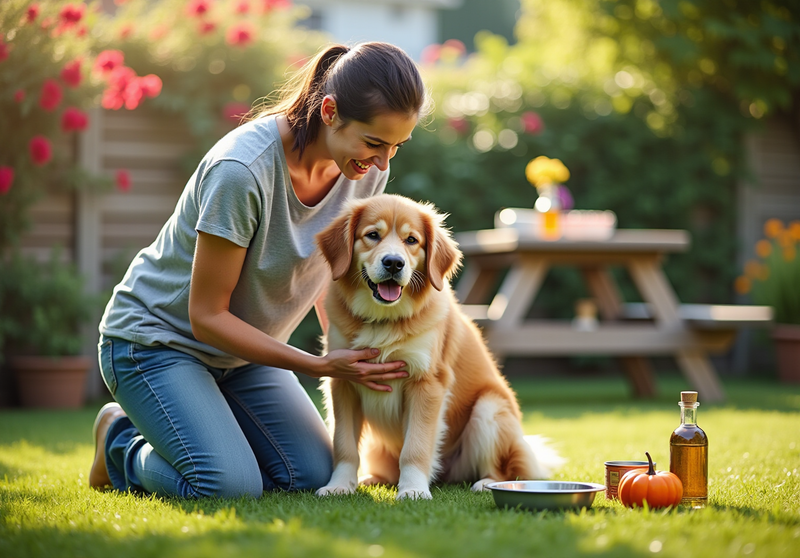
3 Steps to Help Your Constipated Dog Find Relief Fast
Overview
Have you ever worried about your dog's health, especially when they seem uncomfortable? It can be distressing to see your furry friend struggling with constipation. Fortunately, there are three essential steps that can help your constipated dog find relief quickly:
- Increasing water intake
- Making dietary adjustments
- Ensuring regular exercise
These remedies are not just simple suggestions; they are backed by the understanding that hydration, high-fibre foods, and physical activity can stimulate bowel movements and alleviate constipation. Moreover, it's crucial to remember that if your dog's symptoms persist or worsen, consulting a veterinarian is always the best course of action.
By addressing these concerns with compassion and care, you can help your beloved pet feel better. Let's take these steps together to ensure your dog’s comfort and health!
Introduction
Constipation can be a distressing issue for dogs, often leading to discomfort and concern for their owners. Have you ever worried about your dog's health? Understanding the causes and symptoms of this condition is essential for any pet parent looking to ensure their furry friend's well-being.
This article delves into effective strategies to alleviate constipation in dogs, offering practical home remedies and insights into when veterinary intervention is necessary. Moreover, what can be done to help a constipated dog find relief, and how can owners distinguish between a manageable issue and a serious health concern?
Understand Dog Constipation: Causes and Symptoms
Constipation in a constipated dog can stem from various causes, including dietary deficiencies, dehydration, lack of exercise, or underlying health issues. As a caring dog owner, have you ever worried about your furry friend’s well-being? Recognising the signs of constipation is crucial for timely intervention. Common symptoms to look for include:
- Infrequent bowel movements: Dogs typically defecate at least once a day. If your dog hasn’t had a bowel movement in 24-48 hours, your dog may be a constipated dog.
- Straining or discomfort: Watch for signs of straining during attempts to defecate, which may indicate discomfort or pain.
- Hard, dry stools: If the stool is hard and dry, it’s a clear sign of difficulty in passing.
- A constipated dog may show a loss of appetite and have a decreased interest in food.
- Lethargy: If your dog appears unusually fatigued or inactive, it might indicate discomfort associated with digestive issues.
Recognising these symptoms early can help you take timely action to alleviate the discomfort of your constipated dog. Moreover, incorporating Scooch's Fibre Formula, which includes beneficial probiotics, can support healthy digestion and nutrient absorption, helping to maintain a balanced gut microbiome. In addition, Scooch's Fibre Formula is designed to reduce bloating and gas, further enhancing your dog's overall digestive comfort and immune system support. This makes it an effective solution for relieving digestive issues. Consider giving your dog the comfort they deserve with Scooch's Fibre Formula.
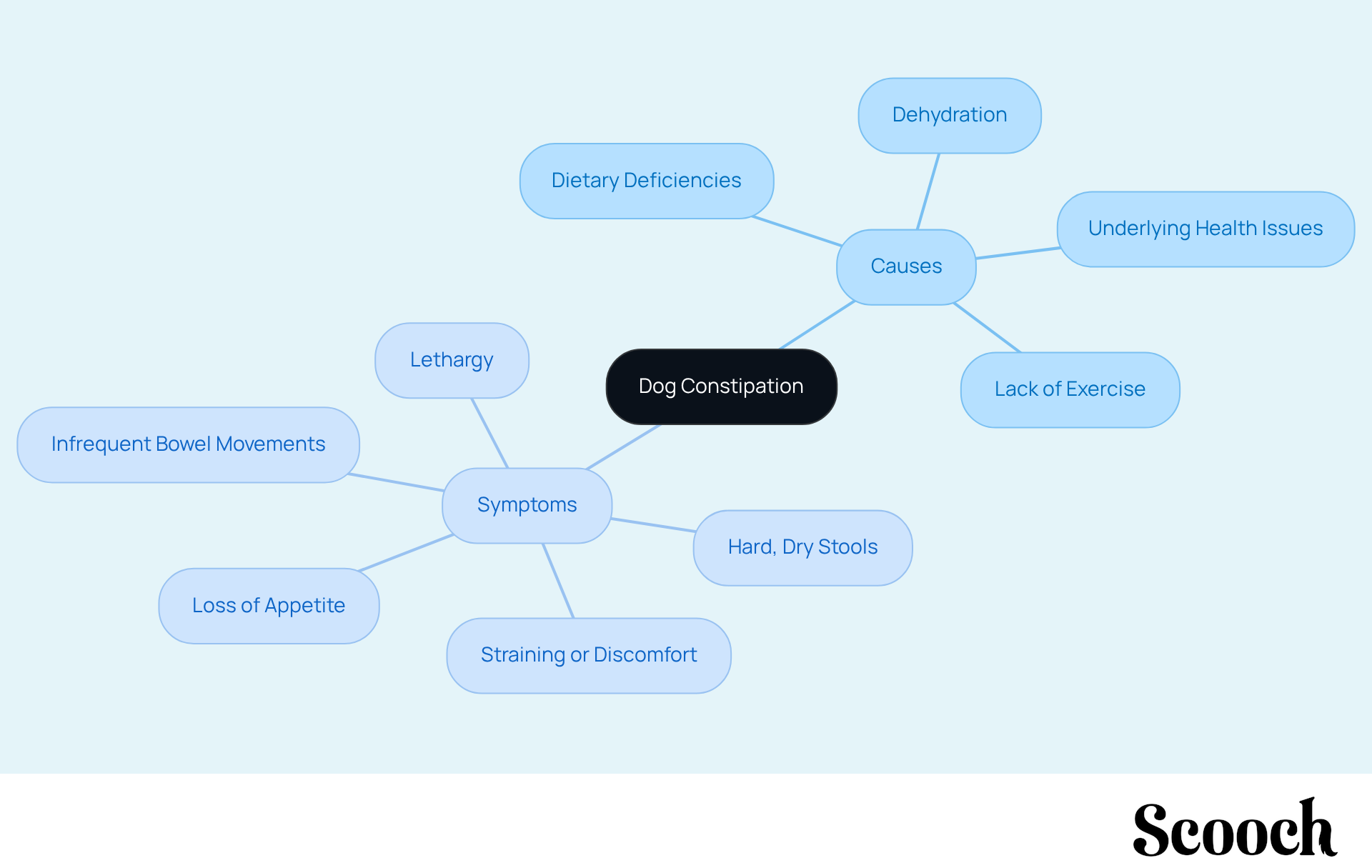
Implement Home Remedies for Immediate Relief
If you have a constipated dog, you may be feeling worried and unsure about how to help. Fortunately, there are several home remedies that can provide immediate relief and support your constipated dog's comfort.
-
Increase Water Intake: One of the simplest steps is to ensure your dog has access to fresh water at all times. Dehydration can worsen the condition of a constipated dog, so encourage hydration by adding water or low-sodium broth to their food.
-
Dietary Adjustments: Have you considered introducing high-fibre foods into your dog's diet? Canned pumpkin (not the spiced pie filling) is an excellent source of fibre that can help regulate bowel functions. Start with 1-2 tablespoons mixed into their food. Additionally, incorporating Scooch's prebiotics and probiotics can enhance gut health, which is particularly beneficial for a constipated dog, promoting better nutrient absorption and overall digestive comfort.
-
Exercise: Regular physical activity is crucial for encouraging bowel function. Taking your dog for a walk or engaging in playtime can stimulate movement and support their digestive health.
-
Olive Oil or Coconut Oil: Another helpful remedy is a small amount of olive oil or coconut oil. Just 1 teaspoon for small dogs or 1 tablespoon for larger dogs can help lubricate the intestines and ease the passage of stool.
-
Probiotics: Consider adding Scooch's vet-formulated probiotics, which contain Bacillus Coagulans, to your dog's diet. This friendly bacteria not only helps reduce harmful bacteria but also supports your dog's immune system and digestive health. It’s particularly beneficial for maintaining regularity and preventing runny stools.
Always monitor your constipated dog after you implement these remedies. If symptoms persist, please consult a veterinarian. Your dog's health and happiness are worth it!
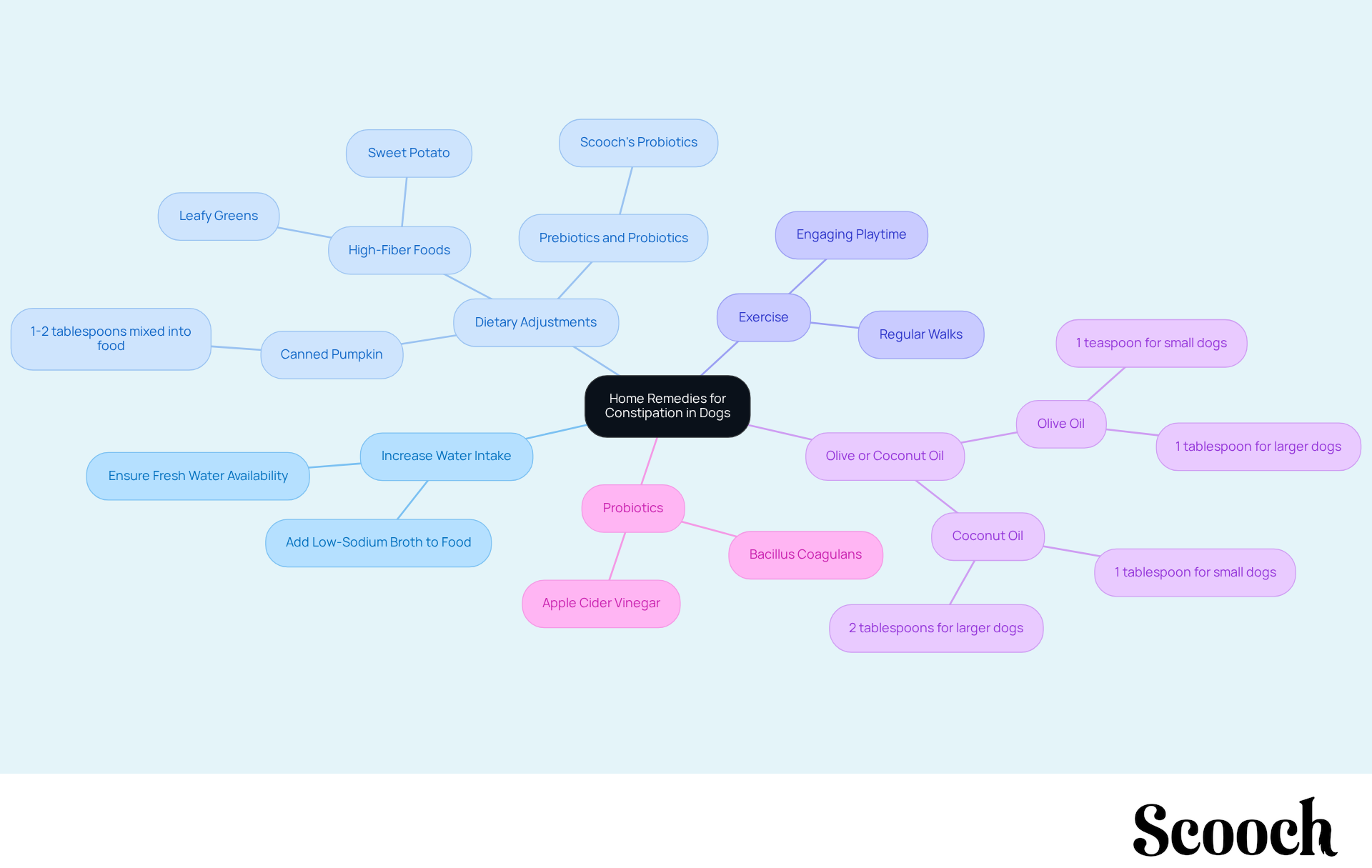
Recognize When to Consult a Veterinarian
While many cases of constipation can be managed at home, there are situations that truly require veterinary intervention. Have you ever worried about your dog's health? It's crucial to consult a veterinary surgeon if you observe any of the following signs:
- Persistent Constipation: If your dog hasn’t had a bowel movement for more than 48 hours despite your efforts with home remedies, this could indicate a more serious issue. As veterinary surgeon Brittany Kleszynski wisely points out, "If your dog has not passed faeces for two to three days, it’s important to see a veterinary surgeon to determine the underlying cause."
- Severe Straining: Excessive straining, especially when accompanied by signs of pain, is a red flag. Dogs may strain to defecate without producing stool, which can lead to further complications.
- Vomiting: If your dog is vomiting or showing signs of distress, it may indicate an underlying medical issue that requires immediate attention.
- Blood in Stool: The presence of blood in your dog's stool or around the rectal area is a serious concern that warrants prompt veterinary evaluation.
- Abdominal Swelling: A swollen abdomen can indicate severe conditions such as intestinal obstruction or other gastrointestinal issues, necessitating urgent veterinary care.
In these situations, a veterinary surgeon can perform a thorough examination and may suggest diagnostic tests or treatments designed to tackle the underlying issue of bowel obstruction. Moreover, prompt action is crucial, as unaddressed bowel issues can progress into serious complications, including obstipation and megacolon, which necessitate more invasive treatments. Statistics show that untreated constipation can lead to severe health conditions, underscoring the urgency of seeking veterinary care promptly.
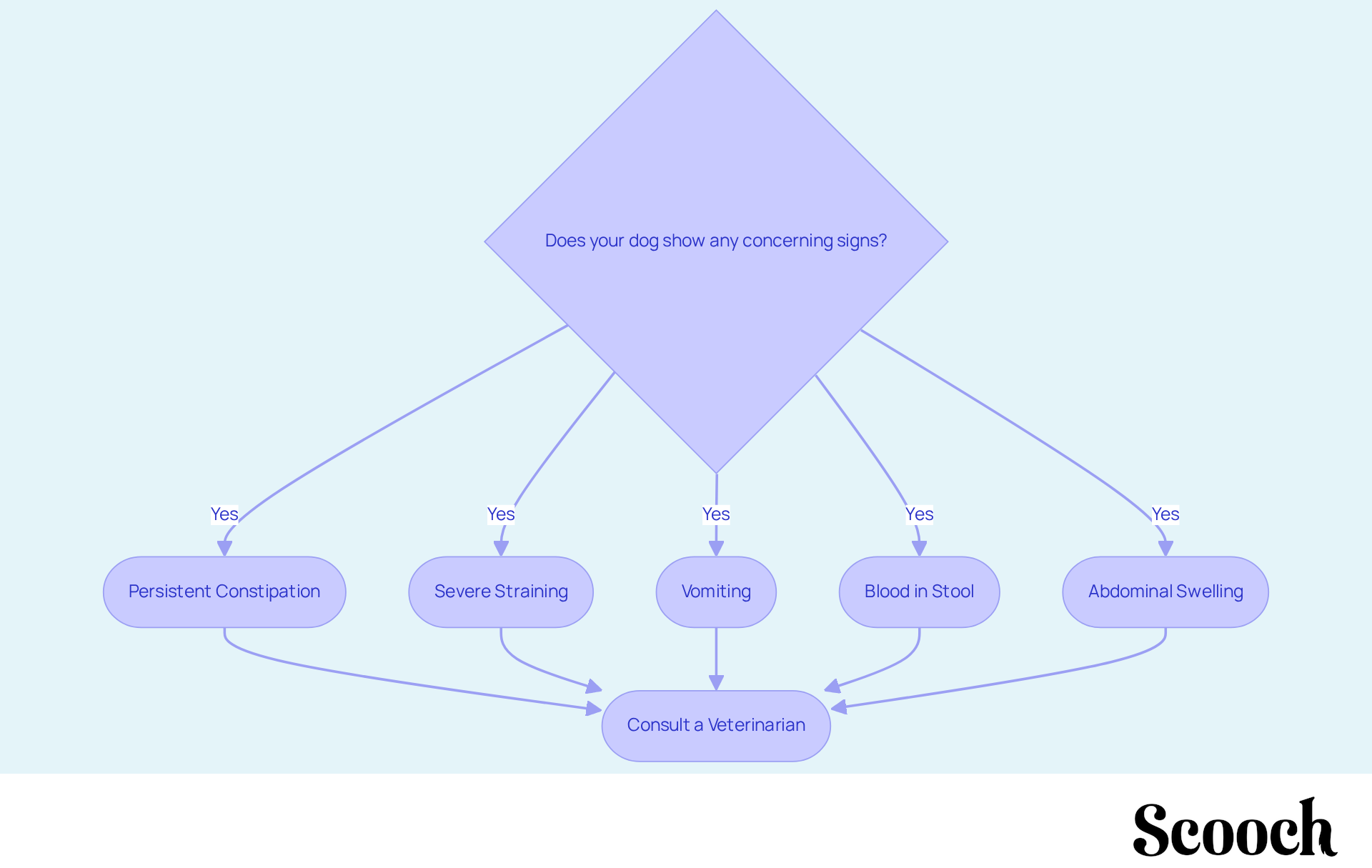
Conclusion
Understanding how to effectively address dog constipation is essential for any pet owner concerned about their furry friend's health. Have you ever worried about your dog's well-being? By recognising the symptoms, implementing home remedies, and knowing when to seek veterinary care, relief can be achieved swiftly and effectively. This holistic approach not only alleviates discomfort but also promotes long-term digestive health.
Key strategies to consider include:
- Ensuring proper hydration
- Incorporating high-fibre foods
- Encouraging regular exercise
Moreover, the use of beneficial supplements like probiotics can significantly enhance gut health. It is important to monitor your dog's condition closely and act promptly if symptoms persist, as early intervention can prevent more serious complications.
Ultimately, taking proactive steps to manage your dog's constipation can lead to a happier, healthier life for your pet. By being attentive to their needs and making informed choices, dog owners can ensure their companions enjoy optimal digestive health. Prioritising your dog's well-being not only strengthens the bond you share but also contributes to their overall happiness and vitality.
Frequently Asked Questions
What causes constipation in dogs?
Constipation in dogs can be caused by dietary deficiencies, dehydration, lack of exercise, or underlying health issues.
What are the common symptoms of constipation in dogs?
Common symptoms of constipation in dogs include infrequent bowel movements, straining or discomfort during attempts to defecate, hard and dry stools, loss of appetite, and lethargy.
How often should a dog typically defecate?
Dogs typically defecate at least once a day. If a dog hasn’t had a bowel movement in 24-48 hours, it may be constipated.
What should I look for to identify if my dog is constipated?
Look for infrequent bowel movements, signs of straining or discomfort, hard and dry stools, a loss of appetite, and unusual lethargy.
How can I help relieve my dog's constipation?
Incorporating products like Scooch's Fibre Formula, which includes beneficial probiotics, can support healthy digestion and nutrient absorption, helping to alleviate constipation.
What additional benefits does Scooch's Fibre Formula provide?
Scooch's Fibre Formula can help reduce bloating and gas, enhance overall digestive comfort, and support the immune system in dogs.
List of Sources
- Implement Home Remedies for Immediate Relief
- Constipation in dogs | Dog health | The Kennel Club (https://thekennelclub.org.uk/health-and-dog-care/health/health-and-care/a-z-of-health-and-care-issues/constipation)
- Home Remedies for Dog Constipation | AKC Pet Insurance (https://akcpetinsurance.com/blog/home-remedies-for-dog-constipation)
- (https://akc.org/expert-advice/health/dog-constipation)
- Home Remedies for Dog Constipation (https://wedgewood.com/blog/10-home-remedies-for-dog-constipation)
- How to Relieve Constipation in Dogs: Causes, Symptoms, and Treatment (https://waggel.co.uk/blog/post/how-to-relieve-constipation-in-dogs)
- Recognize When to Consult a Veterinarian
- Constipation in dogs | Dog health | The Kennel Club (https://thekennelclub.org.uk/health-and-dog-care/health/health-and-care/a-z-of-health-and-care-issues/constipation)
- Dog constipation (https://pdsa.org.uk/pet-help-and-advice/pet-health-hub/conditions/dog-constipation)
- How to Relieve Constipation in Dogs: Causes, Symptoms, and Treatment (https://waggel.co.uk/blog/post/how-to-relieve-constipation-in-dogs)
- Everything You Need To Know To Handle Constipation In Dogs - Vetster (https://vetster.com/en/wellness/everything-you-need-to-know-to-handle-your-dog-s-constipation)
- Dog Constipation: Treatment and When To Call Your Vet (https://petmd.com/dog/symptoms/dog-constipation)
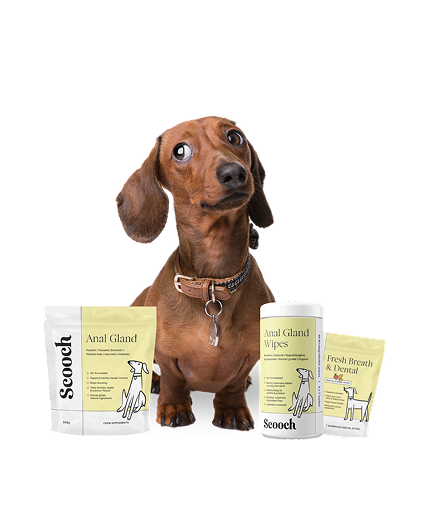
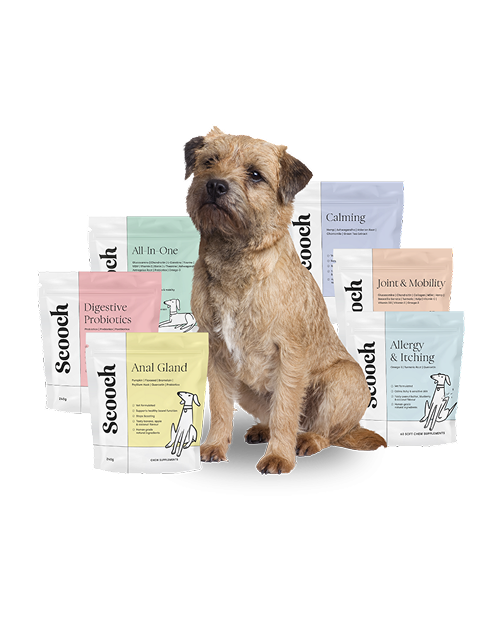
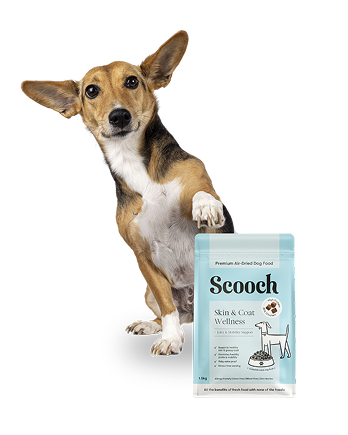
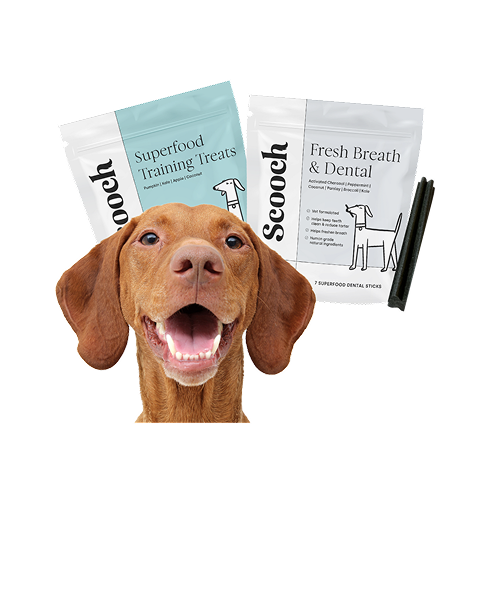
 Scooch health
Scooch health